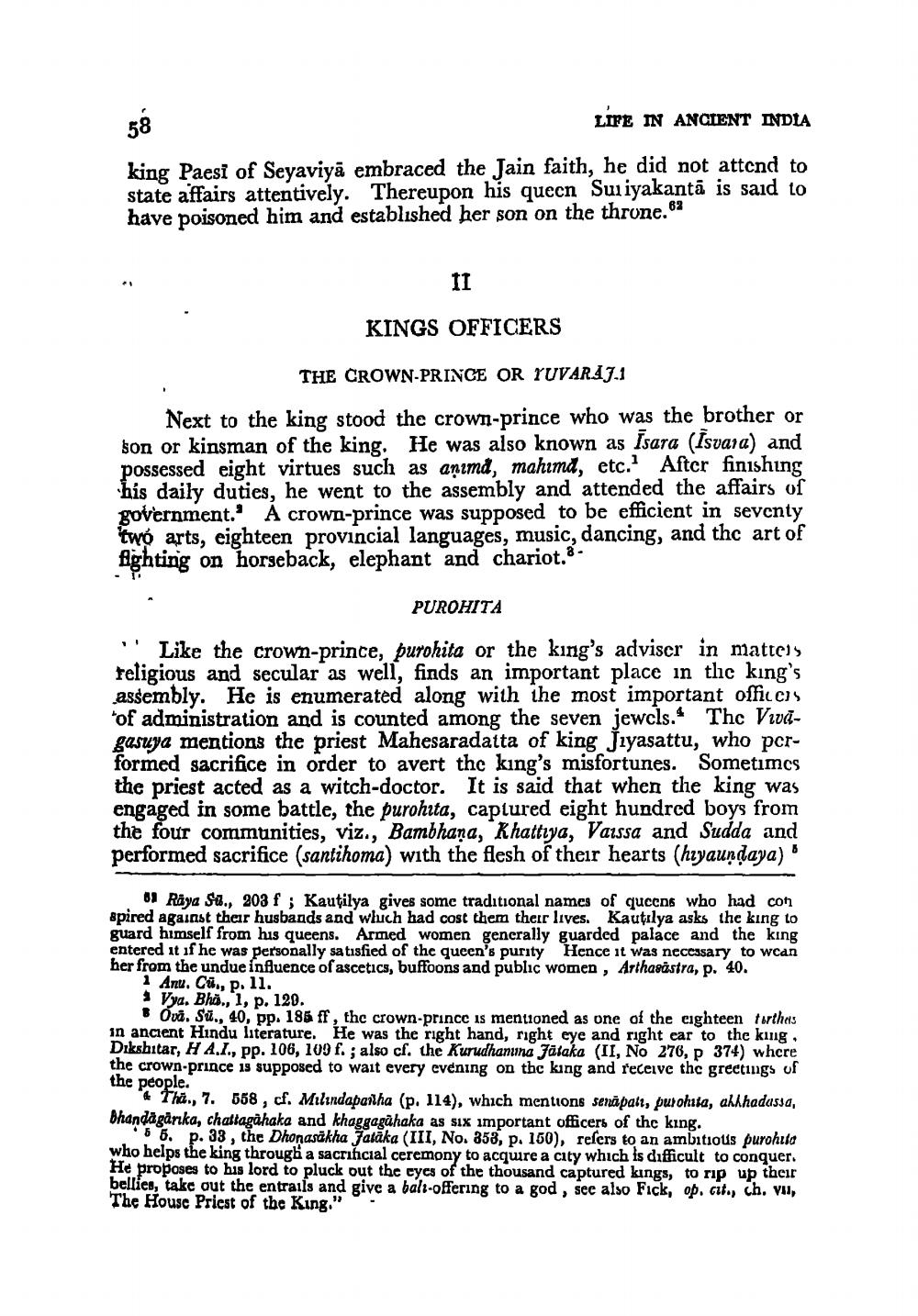________________
LIFE IN ANCIENT INDIA
king Paesi of Seyaviyā embraced the Jain faith, he did not attend to state affairs attentively. Thereupon his quecn Sui iyakantā is said to have poisoned him and established her son on the throne. 62
TL
KINGS OFFICERS
THE CROWN-PRINCE OR YUVARAJ.1
Next to the king stood the crown-prince who was the brother or son or kinsman of the king. He was also known as Isara (Isvara) and possessed eight virtues such as animd, mahimd, etc. After finishing his daily duties, he went to the assembly and attended the affairs of government. A crown-prince was supposed to be efficient in seventy two arts, eighteen provincial languages, music, dancing, and the art of fighting on horseback, elephant and chariot.8 -
PUROHITA
" Like the crown-prince, purohita or the king's adviser in matters religious and secular as well, finds an important place in tlic king's assembly. He is enumerated along with the most important officers of administration and is counted among the seven jewels. The Viagasuya mentions the priest Mahesaradatta of king jiyasattu, who performed sacrifice in order to avert the king's misfortunes. Sometimes the priest acted as a witch-doctor. It is said that when the king was engaged in some battle, the purohita, captured eight hundred boys from the four communities, viz., Bambhana, Khattıya, Vaissa and Sudda and performed sacrifice (santihoma) with the flesh of their hearts (hıyaundaya)
01 Raya Sa., 203 f ; Kautilya gives some traditional names of quccns who had con spired against their husbands and whuch had cost them their lives. Kautilya asks the king to guard himself from his queens. Armed women generally guarded palace and the king entered it if he was personally satisfied of the queen's purity Hence it was necessary to wcan her from the undue influence of ascetics, buffoons and public women , Arthasastra, p. 40.
1 Anu. Cü., p. ll.
Vya. Bhõ., 1, p. 120.
& Ovå. Su., 40, pp. 186 ff, the crown-princc is mentioned as one of the eighteen tarthas in ancient Hindu literature. He was the right hand, right eye and right car to the king. Dikshitar, HA.I., pp. 106, 109 f.; also cf. the Kurudhanuna Jalaka (II, No 276, P 374) where the crown-prince is supposed to wait every evening on the king and receive the greetings of the people.
* Tha., 7.558, cf. Milındapantha (p. 114), which mentions senā palt, purohita, ahlhadassa, Bhandagărika, chaltagàhaka and khaggagahaka as six important officers of the king.
65. p. 33, the Dhonasäkha Fatāka (III, No. 858, p. 150), refers to an ambitious purohula who helps the king through a sacrificial ceremony to acquire a city which is difficult to conquer. He proposes to his lord to pluck out the eyes of the thousand captured kings, to rip up their bellies, take out the entrails and give a balz-offering to a god, see also Fick, op. cit., ch. V, The House Priest of the King."




